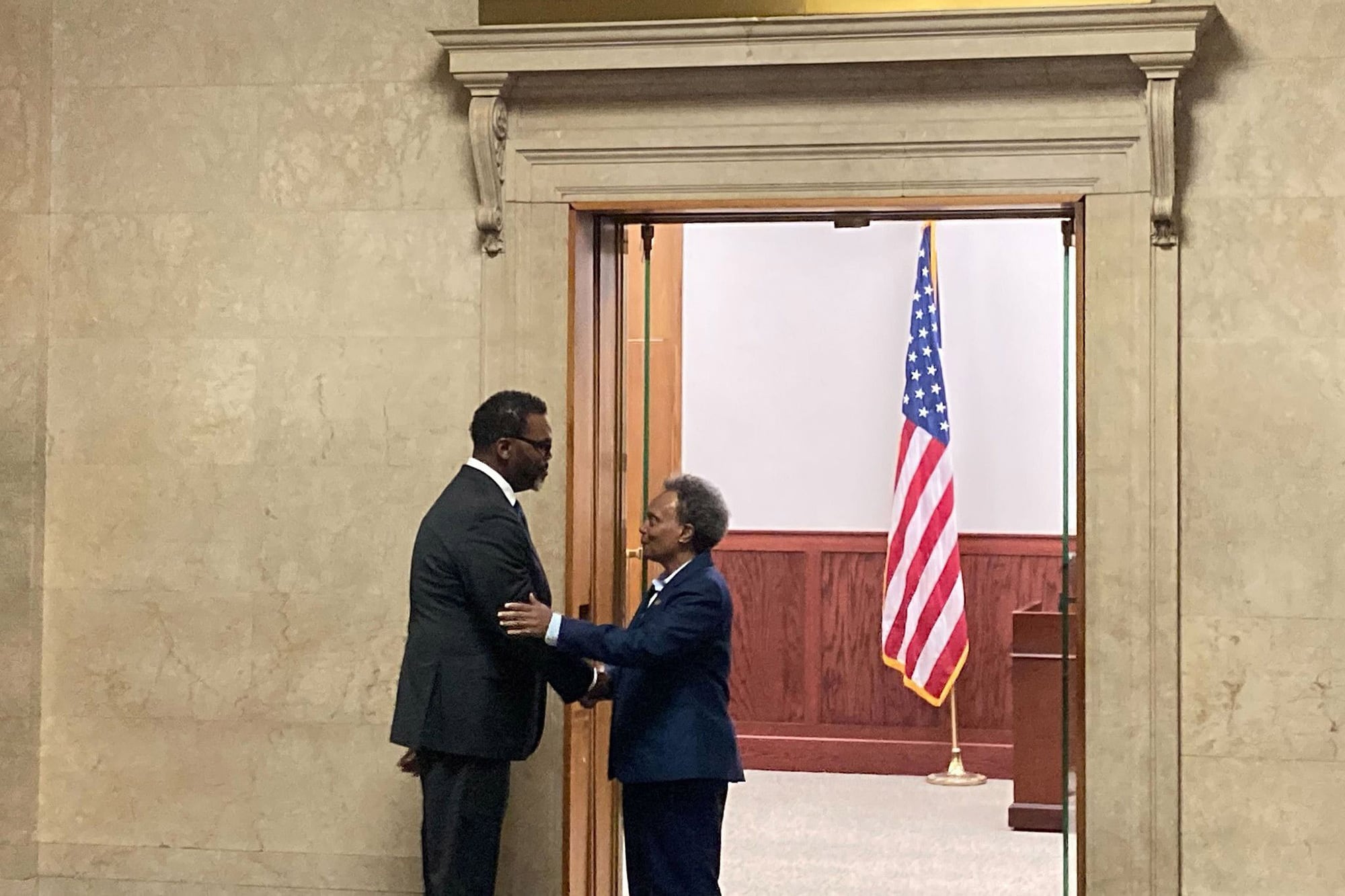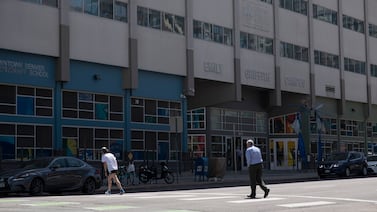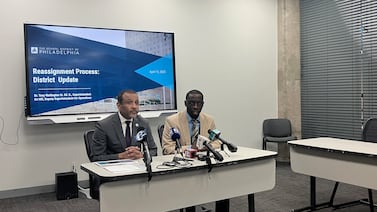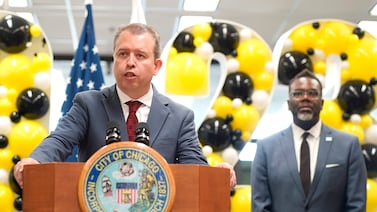The direction of public education in Chicago changed last week when voters elected a teachers union organizer and former middle school teacher to be the city’s next mayor over a former schools chief and education consultant.
Brandon Johnson, 47, clinched victory with 52% of the vote over Paul Vallas, 69, and will be sworn in as mayor on May 15.
He comes to the job with more experience in public education than most, if not all, previous mayors. Johnson will also be the first mayor in recent memory to hold the title of a public school parent. And he’ll be the last with the power to appoint the school board.
But most significantly, Johnson brings a teachers union-friendly perspective that rejects many of the education ideas that once dominated Democratic politics and defined Vallas’ career: a focus on accountability for schools, teachers, and students, market-based school choice, and top-down decision-making from the mayor. Support from Democrats for those ideas began to erode years ago, making Johnson’s rise part of a bigger national shift.
“The former bipartisan ground that the Paul Vallas-esque reformers used to occupy, where do they stand anymore?” said Sarah Reckhow, a political scientist at Michigan State University who studies education policy. “The ground has shifted beneath them.”
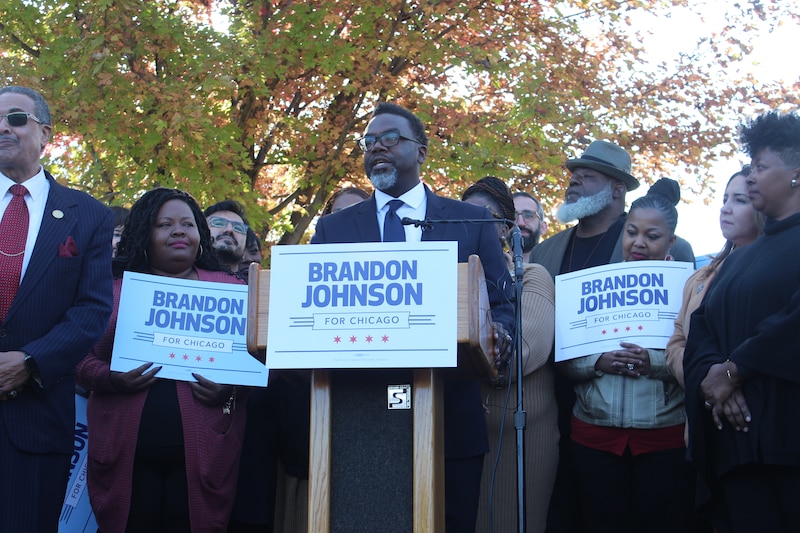
Johnson’s win is also a win for local progressives, who see it as the culmination of years of effort. His education agenda — which closely mirrors policy papers put out by the Chicago Teachers Union over the past several years — calls for more funding for traditional public schools, higher pay for teachers, and additional social services for students.
Emma Tai, executive director of United Working Families, which endorsed Johnson and helped turn out the vote with an army of field organizers, said Johnson’s victory comes after a “years-long journey” of “sustained, aspirational” organizing.
“Both (Donald) Trump’s secretary of education and (Barack) Obama’s secretary of education endorsed Paul Vallas and he lost,” said Tai. “A working-class majority defeated a bipartisan, wealthy donor consensus on public education. And I think that any Democrats with national aspirations or presidential aspirations need to pay pretty close attention to that.”
Johnson’s victory follows a decade of growing union strength
The start of Johnson’s political career can be traced to the summer of 2011, when he left the classroom to become an organizer with the Chicago Teachers Union.
For more than a decade prior, Chicago had been a testing ground for a vision of school improvement that relied on accountability and pushed publicly-funded, privately-run charter schools as engines of improvement.
In this worldview, held by Democrats and Republicans alike, teachers unions were seen as stubborn barriers to progress, intent on preserving an adult-centered status quo.
When Johnson became an organizer, Rahm Emanuel, Obama’s first chief of staff, had just been elected mayor and Illinois lawmakers had passed a new law reforming teacher tenure and limiting the Chicago Teachers Union’s ability to strike. It was one of dozens of laws passed across the country — in red and blue states alike — aimed at weakening the collective bargaining rights of teachers.
That did not sit well with classroom teachers.
A year earlier, a high school chemistry teacher named Karen Lewis had been elected as the new president of the Chicago Teachers Union on a platform promising to oppose charter school expansion, stop neighborhood school closures, and take on high-stakes testing and accountability.
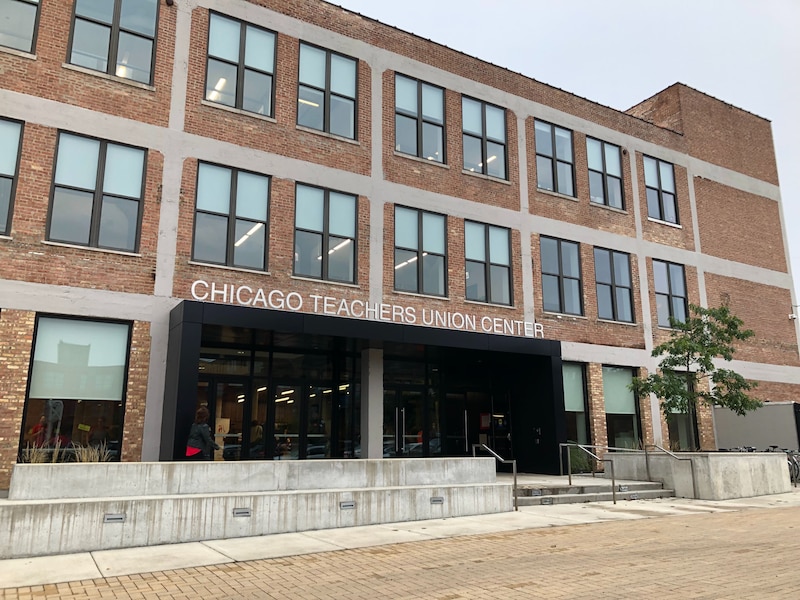
Lewis and Emanuel became foils on the future of public education in Chicago — and nationally. They battled over seemingly everything — how long the school day and year should be; how teachers should be evaluated and compensated; and eventually, whether or not 50 public schools should be shuttered.
Though Emanuel succeeded in shuttering 50 schools, Lewis said the “fight for education justice” would “eventually move to the ballot box.”
“Clearly, we have to change the political landscape in this city,” Lewis said on the day the school board voted on the school closures in 2013.
That moment galvanized more than just the teachers union. Tai, now the head of United Working Families, said those closures prompted her to get into politics.
“I was like, ‘Oh, I don’t want them to be able to do this anymore,’” Tai said. “What’s it going to take so that I never have to be at a Board of Education meeting again, watching as Black parents are dragged out by white jacketed security guards while they’re crying? I never want to have to see that again.”
Johnson was one of the boots on the ground for the teachers union during this time, convening groups of teachers from schools on the South and West Sides and building coalitions with community organizations.
He helped elect City Council members in 2015 and supported Jesus “Chuy” Garcia’s bid for mayor when Lewis was sidelined by a brain tumor. In 2018, Johnson ran for a seat on the Cook County Board of Commissioners and won — a victory Lewis applauded in a letter to teachers when she resigned as CTU president.
But in 2019, the union’s endorsed candidate for mayor, Toni Preckwinkle, lost to outgoing Mayor Lori Lightfoot in a landslide. That fall, teachers went on strike for 11 days and although the union secured some significant wins, the protracted fight left some teachers and parents frustrated. Still, this spring, the union’s existing leadership won re-election.
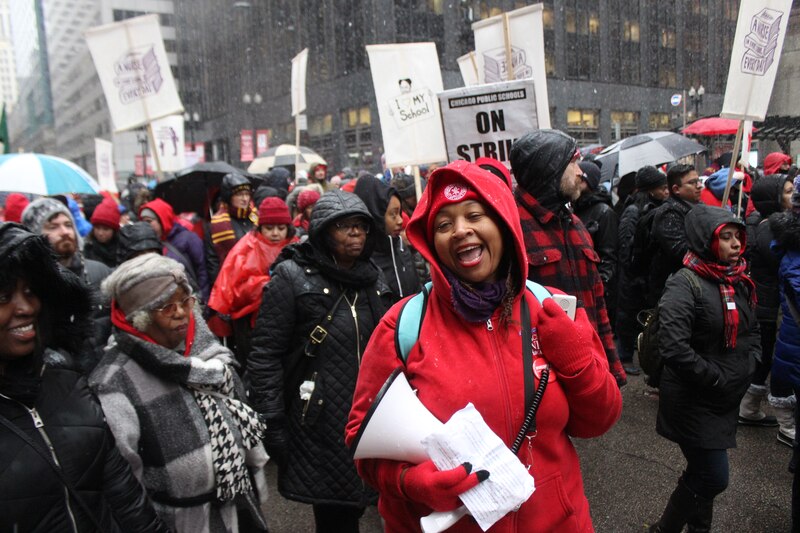
Johnson’s ascension to mayor is now an ironic — and perhaps fitting — end to three decades of mayoral control over Chicago Public Schools, a major priority of the union’s. In an interview last week, Johnson told Chalkbeat that he still supports eventually relinquishing control to an elected school board now that he’s been elected.
“Anyone else would say, ‘Well, now that we have it, we’re good because we have our mayor. So let’s keep it. Let’s keep mayoral control,’” he said. “That would miss the moment … We still believe that democracy is the best form of governance for our public school system.”
Mayoral campaign becomes an indictment of education reform
The union had tried and failed twice in the last decade to put an ally in the mayor’s office. But Vallas was a different kind of opponent, and the union capitalized on growing skepticism among Democrats about his education record.
He rose to prominence in 1995 as the first CEO of Chicago Public Schools after the state legislature handed control of the system to then-Mayor Richard M. Daley. He became a leading advocate for and adopter of the education-reform playbook touted by both Democrats and Republicans throughout the early 2000s.
Defenders of Vallas say he fixed entrenched problems and improved outcomes for students. But others, including the CTU, say he left a “trail of destruction” in the places where he worked — which Johnson supporters highlighted during an event on the city’s South Side just weeks before the election. Vallas supporters disrupted that event and called their claims “completely untrue.”
Still, Johnson’s campaign continued to focus on Vallas’ complicated schools legacy, even releasing a two-minute ad with parents from New Orleans and Philadelphia talking about teachers being fired during Vallas’ time leading those districts.
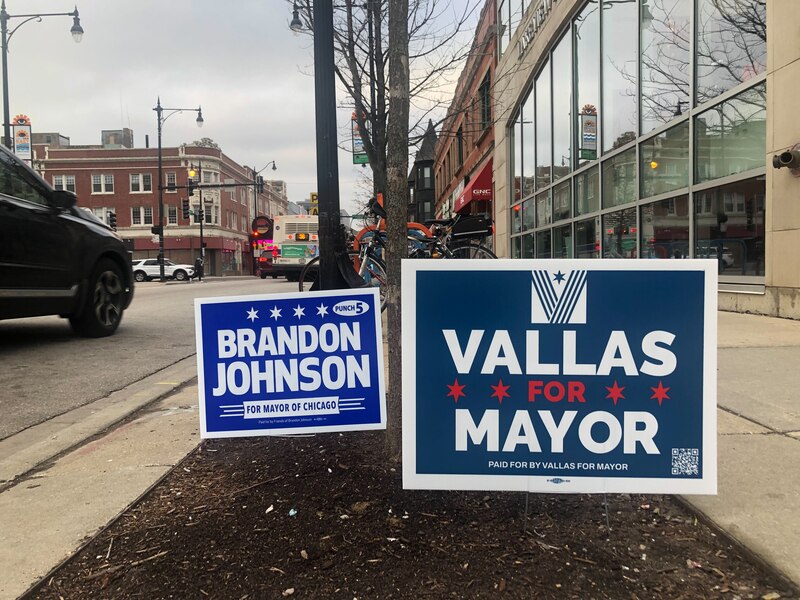
Peter Cunningham, founder and board chair of Education Post and former assistant secretary at the U. S. Department of Education, said Vallas — and his record on education running school systems in Philadelphia, New Orleans, and Chicago — were mischaracterized and unfairly maligned. Vallas advocated for more than just school choice and high-stakes accountability, he said. For example, he started a program that still exists to provide Chicago Public Schools students with free eye exams and eyeglasses and developed a school-based teen pregnancy program. He built more than 70 new school buildings — including the one where Johnson eventually taught middle school.
“I would not say the reform movement was a failure in any sense,” Cunningham said. “I would say that it had considerable successes.”
And even though Johnson’s campaign criticized Chicago’s system of school choice that Vallas helped to build, he has taken advantage of it for his three children, two of whom attend a magnet elementary school and one who attends a neighborhood high school that is not his zoned school. That’s a reflection of the way Chicago Public Schools has been reshaped by the changes of the last two decades in ways that are likely to outlast any mayor.
“We’ve seen a lot of improvement in Chicago over the last 15 years,” said Elaine Allensworth, Lewis-Sebring director of the UChicago Consortium on School Research, which has studied Chicago Public Schools since 1990.
More students are graduating high school, going to, and finishing college. Student learning accelerated between 2009 to 2014 — with students gaining six years worth of education in five — according to research out of Stanford University. Out-of-school suspensions have decreased.
“No matter what you think about the reforms of the last 30 years, that’s not the question,” Cunningham said.
“The question is: What do you want to do in the next 10?”
The work beyond the classroom walls begins
The vision laid out by the teachers union more than a decade ago will come to fruition on May 15 when Johnson is sworn in as mayor.
Now, he will have the chance to tackle the issues beyond the classroom, beyond the school building, beyond the district administration. As he moves from an outsider advocating for a certain ideology to decision maker, Johnson will face the realities of governing a city known for its provincial politics, despite being dominated by Democrats.
Johnson will be responsible for a police department grappling with reforms mandated by the federal government and a public health department still dealing with a global pandemic. He’ll oversee multiple city agencies that determine when libraries are open, whether trains run on time, how businesses are licensed, and how to manage garbage pickup and alley rats.
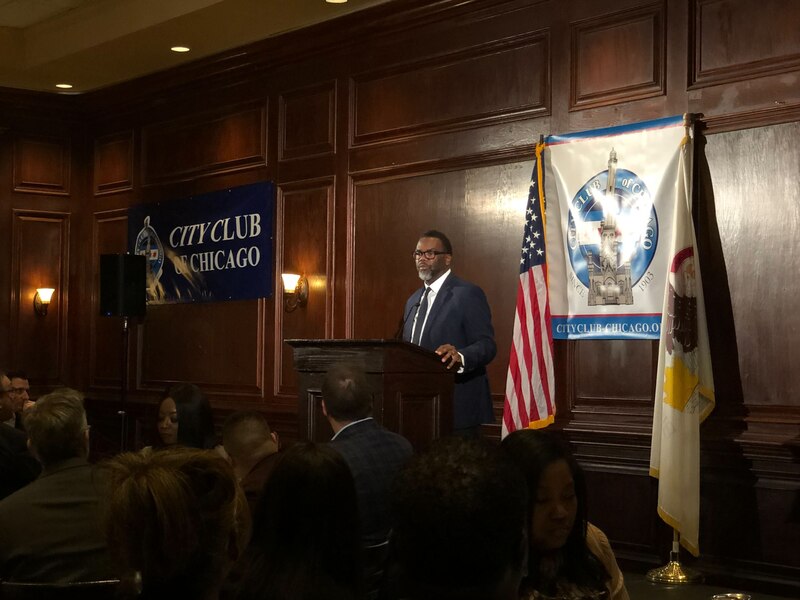
Allensworth said educators have an “innate sense” of how those different sectors — such as transportation, public health, and safety — all impact public schools.
“I do hope that having that knowledge will help him be a good strong coordinator of all those different services in the service of young people in Chicago,” she said.
And although Chicago Public Schools has seen a lot of improvement, the pandemic stymied some of its progress. Chicago’s scores on the nation’s report card last year dropped in math and flat-lined in reading. Long-standing gaps between students of color and their white peers remain. The district’s handling of students with disabilities is being monitored by the state, after a 2018 report found it delayed and denied services to those children.
“There’s so much more work to do,” said former U.S. Secretary of Education Arne Duncan, who led Chicago Public Schools from 2001 to 2008 and now heads a nonprofit focused on violence prevention.
Duncan endorsed Vallas and in doing so, didn’t mention education or schools. In an interview with Chalkbeat, he said the mayoral election was as much about education as it was about public safety, noting that when students drop out of high school, they’re more likely to be shot and killed.
“The consequences here in Chicago for educational failure are pretty staggering,” Duncan said. “This is absolutely about education. It’s absolutely about breaking cycles of poverty and helping people have upward mobility and enter the middle class.”
Now, he said the city needs to rally around Johnson. And he applauded the former teachers union organizer for promising to double the number of youth summer jobs from 30,000 to 60,000 and make that employment program year round.
Johnson has also promised to fund the city’s public schools based on need, not enrollment, which has been declining for the past decade. With schools slated to get their budgets this month, it’s not clear if the formula for doling out money will change in time for next school year. He’s vowed to continue investing in support staff — such as social workers, school nurses, and librarians — which Chicago Public Schools has already started doing using federal COVID recovery money.
He’ll have to negotiate a new contract with his former employer, the Chicago Teachers Union, and decide whether to keep current district leadership, including CEO Pedro Martinez, in place.
Tai, with United Working Families, said Johnson’s win does not mean their work is finished.
“I don’t think it’s ever really over,” she said. “But it’s a game changer, a conversation changer, and once again, Chicago’s in the center of it.”
Patrick Wall contributed reporting.
This story has been updated to correct Peter Cunningham’s title.
Becky Vevea is the bureau chief for Chalkbeat Chicago. Contact Becky at bvevea@chalkbeat.org.

